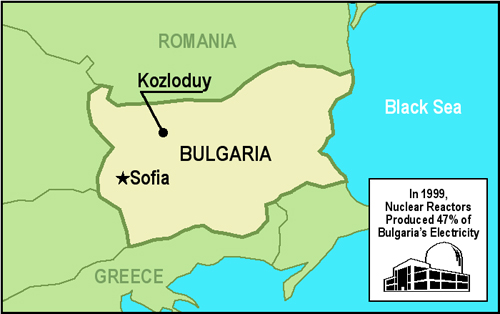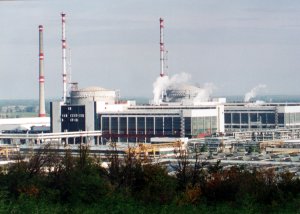 |
 BULGARIA
BULGARIA
Kozloduy Nuclear Power Plant
Country ProfileSize: 42,822 square miles (slightly larger than Tennessee)
Electricity Production1: 38.4 billion kWh (1998 est.)
|

Bulgaria's Nuclear Power Program
Bulgaria operates six units at its Kozloduy nuclear power plant-four VVER-440/230s and two VVER-1000s. Bulgaria has announced that Kozloduy Units 1 and 2 will be shut down before 2003. In 1999, nuclear power supplied 47 percent of the country's electricity. However, that share has often risen to nearly 50 percent because fossil fuel power plants and hydropower plants have not achieved expected outputs.
Bulgaria's Key Nuclear Organizations
- Committee on the Use of Atomic Energy for Peaceful Purposes - Bulgarian nuclear regulatory authority.
- State Agency for Energy and Energy Resources - agency that is the equivalent to U.S. Department of Energy; responsible for all energy-related matters in Bulgaria.
Kozloduy Nuclear Power Plant

Plant Manager: Iordan Iordanov
Telephone No.: 359-973-72020
Fax: 359-973-2591
| Unit | Reactor Model |
Net Output |
Initial Start |
Status |
|---|---|---|---|---|
| 1 | VVER- 440/230 |
400 MWe | 6/1974 | Operating |
| 2 | VVER- 440/230 |
400 MWe | 8/1975 | Operating |
| 3 | VVER- 440/230 |
400 MWe | 12/1980 | Operating |
| 4 | VVER- 440/230 |
400 MWe | 4/1982 | Operating |
| 5 | VVER- 1000 |
910 MWe | 11/1987 | Operating |
| 6 | VVER- 1000 |
910 MWe | 6/1991 | Operating |
Scope and Status of Activities
Efforts to improve safety at the Kozloduy plant were initiated in 1991 with funds received from the U.S. Agency for International Development. These early efforts, which focused on improving the safety of day-to-day operations and improving the physical conditions at the plant, included projects on developing procedures and practices that improve operational safety (1991-1994); improving fire-fighting capabilities (1991-1993); and upgrading engineered safety systems (1992-1993).
Later efforts include seismic analysis of buildings and systems essential to safe operation of the plant (1995-1998); developing and implementing a configuration management system (1995-1999); supporting development of a training center (1996-2000); and developing and enhancing capabilities for performing plant safety analyses (1997-2001).
Accomplishments
Management and Operational Safety
- Processes, hardware, and software were transferred to the plant for developing internationally accepted emergency operating instructions (EOIs) that promote safety through improved accident mitigation strategies.
- All emergency operating instructions for the VVER-440/230 reactors and the VVER-1000 reactors were completed. A series of workshops was completed to support the development of an EOI regulatory infrastructure.
- A complete set of 16 management and operational control procedures that promote safety through improved operating practices were developed and implemented at the plant.
- A configuration management system was developed for the plant.
- The transfer of the Systematic Approach to Training methodology and training materials developed at the Balakovo and Khmelnytskyy Training Centers is ongoing at the Kozloduy plant. This training methodology provides a standard framework for identifying training needs, developing course materials, and teaching. The approach combines classroom instruction with the use of hands-on equipment, including a full-scope simulator. A seminar on Systematic Approach to Training was held for management personnel to ensure familiarity with and support for the methodology.
- Pilot training courses for Shift Supervisors, Reactor Repair Technicians, Mechanical Maintenance personnel, and Control Room Reactor Operators were developed and implemented at the plant. Work was initiated to develop a training course for use of emergency operating instructions.
- Simulator instructor training was provided at the plant.
- The Configuration Management project provided equipment needed to support
implementation of improved configuration management processes at the Shore
Pumping Station and Electrical Switchyard facilities. The upgraded configuration
management program was implemented at the Shore Pumping Station. The plant
will implement the new program at the Electrical Switchboard without U.S.
assistance.
Engineering and Technology Upgrades
- A backup emergency diesel generator was delivered to the plant. The generator provides backup power for operation of key safety systems, should an emergency disable both offsite electrical power and other onsite sources.
- A fire truck, communications equipment, and radiation monitoring equipment were provided to the plant to improve the response capability of the fire brigade.
Plant Safety Evaluations
-
A seismic assessment of the buildings that route key electrical cables for Units 5 and 6 was completed. The assessment identified structural supports that could be vulnerable in an earthquake and recommended meas-
ures to strengthen the supports and anchor the cables. -
A seismic assessment of the plant's essential service water system that provides cooling for safety-related equipment outside the reactor containment areas was completed. The assessment provided recommendations to reduce the seismic vulnerability of pipes and valves.
-
Training was provided to Bulgarian technical specialists to enable them to evaluate the potential for combustion/detonation of hydrogen, which could threaten the plant's containment integrity during accident scenarios.
-
Computers, safety codes, and training were provided to improve the safety analysis capability at the plant. Thermohydraulic models for the VVER-440 and VVER-1000 units were developed and validated.
- A series of training workshops (including a month-long short course) was completed to assist the Bulgarian analytical organizations in completing the thermohydraulic analysis that will validate the operator actions contained in the emergency operating instructions.
| | Contents | Foreword | Program Overview | Armenia | Bulgaria | Czech Republic | Hungary | Kazakhstan | Lithuania | Russia | Slovakia | Ukraine | Appendix A | Appendix B | Appendix C | Contacts | |